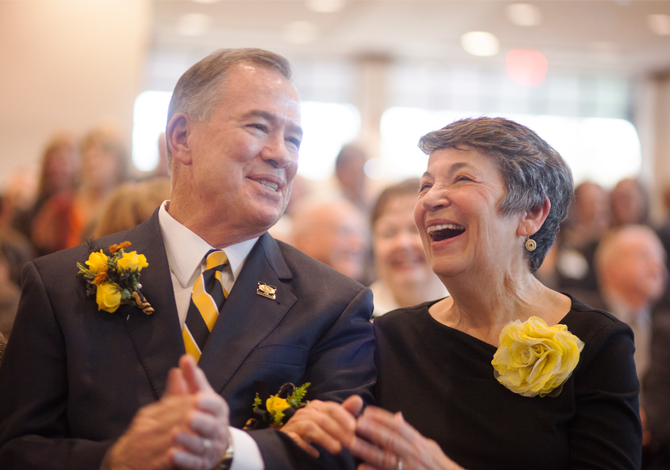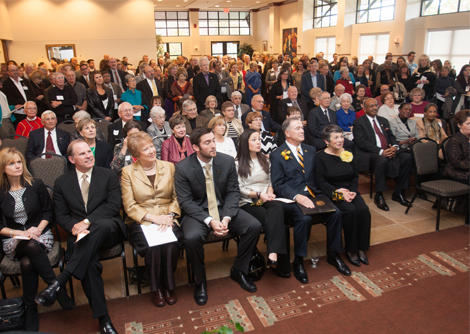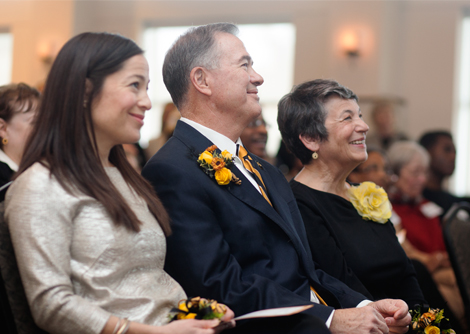
Brady and Anne Deaton share a laugh during the chancellor's retirement reception Monday attended by hundreds of well-wishers. Photo by Rob Hill.
During an emotional reception Monday, Brady J. Deaton said his final public goodbye to friends and colleagues as chancellor of the University of Missouri. Hundreds watched in the Reynolds Alumni Center as administrators, faculty, a student and two Missouri politicians spoke of Deaton’s leadership and integrity.
At his side at the reception and during his nine years as chancellor was Deaton’s wife, Anne, an important factor in his success as MU’s leader, observers said. Deputy Chancellor Michael Middleton presided over the event.
Sen. Kurt Schaefer, R-Columbia, noted that Deaton led MU during an economic downturn and when state appropriations for higher education were in decline. Rep. Caleb Rowden, R-northeast Boone County, said, though he and Deaton sometimes disagreed on issues, he respected the chancellor. “Your shoes will be very hard to fill,” Rowden said.
During his reception address, Deaton spoke of the challenges of being chancellor and thanked members of the chancellor’s staff for their years of hard work. He said they made decisions “with the best of our instincts” while upholding MU’s core values of respect, responsibility, discovery and excellence.
His time leading MU, he said, has been the “most thrilling aspect” of his life.
Deaton’s Record

People filled the Great Room and a hallway in the Reynolds Alumni Center to celebrate the Deatons’ careers. Photo by Rob Hill.
When he became chancellor Oct. 4, 2004, Deaton was dedicated to increasing MU’s reputation in teaching and research and in attracting bright students. The numbers show results.
Since 2004, MU enrollment has increased 28.3 percent to 34,658, and research expenditures have grown 36 percent to $216.5 million. In 2008, the university completed a $1 billion fundraising campaign and in 2012 joined the Southeastern Conference.
Deaton also expanded MU’s arts programs and increased the university’s global footprint.
MU currently has eight faculty who are part of the National Academy of Sciences, including Marilyn Rantz, a member of the academy’s Institute of Medicine. Rantz, a Curators Professor of Nursing whose research team last year received the largest research grant in MU history, thanked Deaton for maintaining academic standards. “Faculty are grateful for your leadership,” Rantz said.
Christina Deaton DeMarea, BA ’93, one of four of the Deatons’ children, spoke of the chancellor’s upbringing in rural Kentucky in a house with no running water, refrigeration or indoor plumbing. To earn extra money for the family, a young Deaton worked in the tobacco fields, she said.
“But he never described his childhood as poor,” DeMarea said. “His achievements are in honor of that upraising.”
Following DeMarea, a 10-minute video created by Web Communications staff and students Jake Hamilton and Nichole Cartmell featured the MU community speaking of Deaton’s leadership, warmth and generosity. The Thailand Students Association wished Deaton well in their native Thai; as a young Peace Corps volunteer, Deaton taught for two years at a Thailand agricultural school, an experience that greatly informed his life.
A Song About Transition

Christina Deaton DeMarea sat next to her parents, Brady and Anne Deaton, at the reception. She spoke of her father's upbringing during her talk. Photo by Rob Hill.
The reception included an honor — a bench in the courtyard of the chancellor’s residence will be inscribed to the Deatons — and a gift — a framed portrait prepared by MU photographer Rob Hill, showing Deaton wearing the Jefferson medallion, a gift at his inauguration as chancellor.
And then the finale. The School of Music’s Show-Me Opera troupe sang “Make Our Garden Grow” by Leonard Bernstein from the operetta Candide, based on Voltaire’s 18th-century work.
The song is about transition to a new stage of life. And following Deaton’s retirement Nov. 15, he and Anne will transition to leading the Brady and Anne Deaton Institute for University Leadership in International Development, which will focus on MU’s role in global food security and sustainability.
At times the troupe’s chorus of voices seemed to raise the room.
Following the 90-minute formal reception, the Deatons stayed another 90 minutes to greet well-wishers.